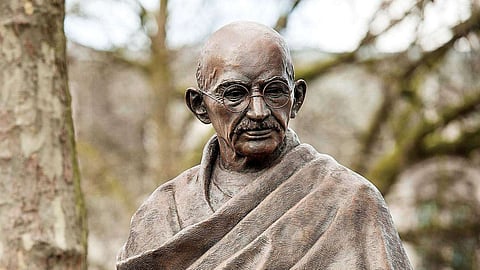

One hundred and fifty three years after the birth of the father of the nation, India finds itself at a juncture, where the values the Mahatma espoused and the dreams he harboured for a modern motherland, seem to be at odds with the ground reality of politics. The present day India might appear to be racing along a trajectory of unprecedented growth and economic prosperity on the outward, a poster child among the colonies of the British Empire that has made its mark on almost every sphere of human achievement. But on the inside, citizens are wracked by a sense of unease and a gnawing cognisance of the fact this might just not be the idea of Swaraj that millions have laid their lives for. The nation which prides itself on the democratic values of equality and equanimity falters in a big way when it comes to protecting the rights of its most vulnerable. The ascension of its first Dalit woman President Droupadi Murmu is a red letter day, but that has been marred by reports of people belonging to the Dalit community being subjected to inhumane atrocities by members of the upper castes. Even as President Murmu was visiting London to pay respects to the deceased British monarch Queen Elizabeth II, there was an episode involving the death of a Dalit schoolboy in Rajasthan at the hands of his school teacher, allegedly hailing from a privileged section of society. The child’s only crime was to have quenched his thirst from a pitcher that was meant for use by the upper caste teachers of the private institution.
Such stories do not have the luxury of being punctuated with a period, as atrocities on members of the backward communities, ironically referred to as Harijans (or children of God) by the Mahatma, are reported dime a dozen in the nation. Just last month, we woke up to the horrifying news of two Dalit teenage sisters being raped and murdered, in Lakhimpur Uttar Pradesh, their bodies hanging by the treetops, a stark reminder of the spectre of sexual violence that hangs on the members of the 80-million women hailing from the Dalit community. And it’s certainly not an endemic issue as women across the board are cautioned when travelling by themselves in the country, where an episode of sexual assault transpires every 20 minutes.
Even the ideas of universal brotherhood that have been ingrained in the Indian ethos with principles such as Vasudeva Kutumbakam, are now facing the axe as we see repeated instances of religious strife tearing the nation into silos spawned from extremism. The ruling dispensation’s stock in trade is sowing the seeds of discord through narratives that paint the minority communities in an unfavourable light. Tellingly, such narratives have made their way right up to the high corridors where policies and laws that could impact the lives of billions are drafted.
The controversial Citizenship Amendment Act and the National Register of Citizens, inspired protests across the nation, on account of the highly polarising nature of the law which seemed to be designed to keep minorities at bay. The announcement of the Act had endangered the citizenship of millions of Muslims whose ancestry can be traced back to Pakistan, Bangladesh and other neighbouring nations, who seemed to have been selectively segregated for mass exodus once the Act came into play. While movements like the sit-in that took place in Shaheen Bagh, New Delhi and slogans like ‘Hum Kagaz Nahi Dikhayenge’ (We won’t disclose our identity) managed to drum up some much deserved opposition to these arbitrary legislations, the damage has been done.
Sadly, today’s Bharatvarsh has little to do with the image of a melting pot of cultures and a harmonious blend of faiths and belief systems that we stood for. The intent is not to overwhelm the reader with grim statistics pertaining to the illusion of an India Shining. But there is a need to re-evaluate what has become of Gandhi’s dream of a politically and spiritually independent India.
Visit news.dtnext.in to explore our interactive epaper!
Download the DT Next app for more exciting features!
Click here for iOS
Click here for Android